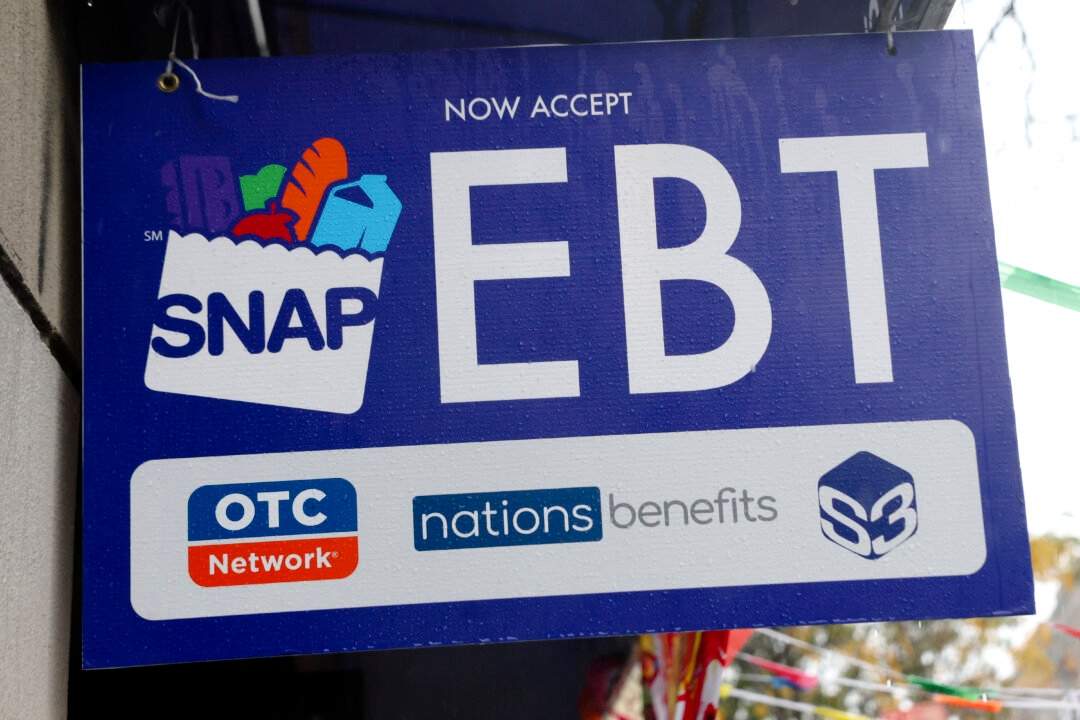
States are complying with a new federal law and narrowing eligibility for the Supplemental Nutrition Assistance Program (SNAP).
The West Virginia Department of Human Services said Nov. 3 it is implementing federally mandated changes to make sure the state is complaint with national guidelines. The updates affect about 36,000 food stamp recipients in West Virginia, the department said.
Massachusetts officials said that while the changes to SNAP are being enforced as of Nov. 1, not all recipients will be immediately affected.
“SNAP benefit changes will happen on a rolling basis at each client’s annual recertification,” the officials said.
Georgia was among the other states confirming that they’re implementing the updates, the Georgia Department of Human Services (DHS) said.
“DHS will communicate directly with clients regarding their case, and any required action and timeline will be outlined in that communication. DHS encourages clients to regularly check the notices section of their Georgia Gateway account for updates,” the department stated on its website.
The One Big Beautiful Bill Act, which President Donald Trump signed into law in July after approval from Congress, made the changes to SNAP.
One update concerns the most stringent work requirement for SNAP recipients designated as able-bodied adults without dependents. Previously, non-disabled adults without dependents aged 18 to 54 had to work 80 hours a month. Now, the requirement also applies to adults aged 55 to 64.
People with dependents used to be entirely excluded from the more stringent requirement, but now parents with children aged 14 or older also have to meet the work requirement.
Exceptions introduced in 2023—for homeless people, veterans, and people aged 24 and younger who were in foster care when they turned 18—ended as of Nov. 1. Unchanged exceptions include being pregnant and not being able to work due to a disability, and new exceptions cover Native Americans.
Those subject to the new work requirement can be limited to receiving food stamps for just three months in a three-year period.
“To continue receiving your SNAP benefits after the three months, you must either comply with the work requirements or report an approved exemption,” the Delaware government informed prospective SNAP participants.
The Congressional Budget Office estimated that some two million people would stop participating in SNAP in an average month due to the new requirements. Around 42 million people receive food stamps in a given month.
Less stringent work requirements for most SNAP recipients, such as accepting a suitable job if it’s offered or not working fewer than 30 hours a week if the recipient already has one, remain in place. Recipients who do not meet those requirements will lose SNAP for one month. If they then meet the requirements, they can start receiving the benefits again. If they later don’t meet the requirements once more, then they lose the benefits for longer than a month and face permanent disqualification from the program.
Taking care of a child aged 5 or younger or participating in a treatment program for drugs or alcohol use are among available exceptions to the general work requirements.
Immigrant Eligibility
The U.S. Department of Agriculture (USDA), which runs SNAP with states, also informed states that refugees and some other immigrants are no longer able to receive SNAP benefits.
That includes immigrants who judges ordered not be deported due to concerns about their safety if they were sent to their home country, as well as some Afghan and Ukrainian nationals who were granted parole, Sasha Gersten-Paal, a department official, told states in a memorandum on Oct. 31.
“State agencies must immediately apply the new eligibility criteria to new applicants at initial certification,” the USDA said in a statement. “For households already receiving SNAP, state agencies must review household circumstances and apply these policies at recertification.”
According to the Congressional Budget Office, the change will make about 90,000 people ineligible for SNAP in an average month.
Ending Waivers Blocked in Ruling
The changes started being enforced as payments to SNAP users stopped due to the government shutdown.
U.S. District Judge John McConnell Jr. ordered the USDA to partially or fully fund November benefits. The USDA said they’re working on partially funding the benefits, but it may take weeks or even months to comply. Trump said Tuesday that benefits would not be paid until the government shutdown ends.
McConnell also ordered officials not to terminate any of the waivers for the more stringent work requirements before the waivers’ expiration dates. Plaintiffs in the case argued that the agency acted without legal authorization in moving to terminate the waivers early.
Under the law prior to the One Big Beautiful Bill Act, states could apply for waivers if they demonstrated an area had a “lack of sufficient jobs.” States have frequently received waivers. New York, for instance, has received full or partial waivers since at least 2020.
The waivers are now only allowed if an area has an unemployment rate of at least 10 percent.
The USDA in October encouraged states to terminate active waivers, even if they were not due to expire soon. The department said it would end the waivers in 30 days if states did not do so.